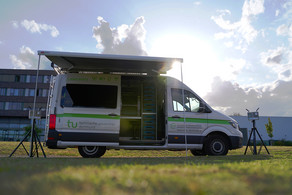Supporting Maritime Search and Rescue Missions through UAS-based Wireless Localization
- Dr.-Ing. Janis Tiemann
- Univ.-Prof. Dr.-Ing. Christian Wietfeld
- Publications
- CPS.HUB
- LARUS
- SFB 876
In IEEE Global Communications Conference Workshops (GLOBECOM Workshops), The 9th International Workshop on Wireless Networking and Control of Unmanned Autonomous Vehicles (Wi-UAV), Abu Dhabi, United Arab Emirates, December 2018.
Abstract:
The use of unmanned aircraft systems to support maritime search and rescue missions holds great potential. Applications range from the fast and efficient search of vessels and persons in distress to the provision of rescue and communication resources. In this paper, we address a received signal strength based localization method of persons without dedicated search and rescue equipment. The specific challenge addressed in this work is to analyze the proposed localization method under realistic conditions. Thus, a maritime channel model is implemented and by means of field tests experimentally validated. Furthermore, the proposed approach is evaluated in a two step concept: In the first step the capability of different search patterns and localization algorithms is analyzed and evaluated in a hardware in the loop simulation environment. In the second step, a scaled experimental setup, which uses a technology comparable to cellular communications, is evaluated to prove the viability of the overall system. Besides the overall accuracy, the required localization time is a key performance indicator. The resulting outcome of the simulations using active trajectory generation underlines the potential of the discussed approach by achieving localization errors of lower than 200 m in under 10 mins. The experimental results obtained in the outdoor field test of under 30 m absolute euclidean error confirm the simulative results and verify that the proposed concept can significantly improve search and rescue operations.






